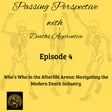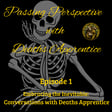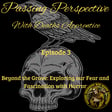Become a Creator today!Start creating today - Share your story with the world!
Start for free
00:00:00
00:00:01

Beyond the Grave: Innovative Farewells and Modern Memorials
Show Notes: Passing Perspective with Death’s Apprentice - Episode on Evolving Body Disposal and Memorials
Main Theme: This episode delves into the evolving landscape of body disposal and memorial practices, underscoring the importance of pre-planning for oneself or loved ones.
Traditional vs. Modern Methods:
Discussion on the transition from conventional burial practices to eco-friendly options such as natural burials and human composting.
Exploration of innovative methods like alkaline hydrolysis and promession as alternatives to traditional interment.
Body Donation and Creative Memorials:
Insight into body donation for scientific and medical research.
Unique ways to memorialize loved ones, including transforming cremains into jewelry or artwork.
Celebrating Life and Personalized Services:
Emphasis on the emotional significance of life celebrations through customized services that reflect individual personalities and stories.
Digital Shift in Obituaries:
Analysis of the decline of print obituaries due to high costs and the rise of online platforms for memorialization.
Open Conversations and Challenges:
Encouragement for families to engage in open dialogues about end-of-life preferences.
Addressing common challenges with autopsy results and obtaining death certificates.
This episode provides a comprehensive overview of contemporary choices in handling remains, advocating for thoughtful planning and meaningful remembrance.
Transcript
Introduction & Content Warning
00:00:06
Speaker
Thank you for listening to Passing Perspective with Death's Apprentice.
00:00:10
Speaker
Being that this is a podcast about death, dying, and grief, some topics discussed may be triggering for some or not suitable for younger listeners, hence the explicit rating.
00:00:24
Speaker
Listener discretion is advised.
00:00:27
Speaker
Enjoy the show.
Recap & Episode Focus
00:00:46
Speaker
Welcome back to Passing Perspectives.
00:00:49
Speaker
I am your host for this next half hour, Death's Apprentice.
00:00:53
Speaker
And to all my listeners, thanks for listening.
00:00:57
Speaker
The last few episodes, I have spoken on a variety of topics from planning your final wishes to who is who in the death industry, with some horror facts thrown in there.
00:01:07
Speaker
Last episode, I ended with the question about body disposal, and I told you all about the funeral pyre in Colorado and
00:01:15
Speaker
Hopefully it got you thinking about ideas for your own decisions on body disposal.
Body Disposal Methods & Environmental Impact
00:01:21
Speaker
If you're thinking about body disposal, well, you are in luck because that's what this episode is all about.
00:01:29
Speaker
This is not too in-depth because I will probably go into more detail about some of these individually a little bit later, but this is just to give you an idea of some of the options out there.
00:01:43
Speaker
Sometimes it seems like a new option pops up every day, and these days there are so many options to cover all your remaining needs.
00:01:53
Speaker
This is definitely an industry to watch closely.
00:01:57
Speaker
Along with the topic of body disposals, I'm also going to touch on some of the types of memorials that may also be available to you.
00:02:05
Speaker
These can vary widely, especially based on which body disposal method you go with.
00:02:10
Speaker
So from cremation to military honors, grab your notebook.
00:02:14
Speaker
Because today we are learning about body disposals and memorials.
Trends in Cremation & Burial
00:02:53
Speaker
Whether you're pre-planning your own services or planning a loved one's services after they have passed, you will have to make some decisions about what to do with the remains.
00:03:04
Speaker
And even if you want to have a memorial service, that's another decision.
00:03:10
Speaker
It seems like these days more and more people are opting for private services or no services at all.
00:03:17
Speaker
My personal opinion on this is that there should always be some kind of celebration, but that's another episode.
00:03:25
Speaker
I'm going to start this with body disposals though, and what kind of legal body disposal you can find around these parts, and some other options that are not so legal yet, or at least not widely available.
00:03:39
Speaker
As I said before, there are so many options in the area of body disposal and even disposal of cremains.
00:03:47
Speaker
that I probably can't even name them all in one episode.
00:03:50
Speaker
I'm going to break this topic down and start with the most popular two options that everyone is aware of at this point.
00:03:58
Speaker
Burial and cremation.
00:04:01
Speaker
According to some internet statistics,
00:04:04
Speaker
The top choice of body disposal is cremation, and the numbers are steadily increasing year after year.
00:04:11
Speaker
With burial, traditional burial has been steadily declining, being replaced not only by cremation, but with other forms also rising.
00:04:21
Speaker
Natural burial has gone up as well as body donation and human composting.
00:04:28
Speaker
There are a couple of big reasons for the shift in choices.
00:04:32
Speaker
One is pricing, with the cost of cremation often being much lower than a traditional burial.
00:04:38
Speaker
The other is environmental impact.
00:04:41
Speaker
Traditional burial is what most people imagine when they imagine a funeral, and it has been the staple in death care for quite a while.
00:04:51
Speaker
It's the fancy casket and burial plot in the cemetery or in some other family area.
00:04:57
Speaker
It involves a vault and gravedigger, flowers, music, clergy, maybe a church or a chapel, and embalming.
00:05:06
Speaker
It is the image we all see in our heads when we hear the word funeral.
00:05:11
Speaker
Even though it still comes in second as far as disposal choices go, the face of it is changing, contributing to its decline as the way it has been.
00:05:23
Speaker
Natural burial has been on the rise with environmental concerns being a consideration and decision making.
00:05:31
Speaker
People are going with natural burial options more and more.
00:05:35
Speaker
These types of burial options include a myriad of choices ranging from not being embalmed to being buried in a natural cemetery or plot with or without a casket or a special type of casket or a vault or no vault.
Innovative Burial Methods
00:05:54
Speaker
It doesn't stop there though.
00:05:56
Speaker
These options are expanding, and while mostly still in prototype phases and not generally available at this point, there are burial pods grow trees from your remains in like biodegradable coffins and mushroom suits and mushroom coffins that speed up decomposition with mushrooms.
00:06:15
Speaker
These options are pretty much helping with decomposition and kind of speeding it along.
00:06:22
Speaker
Along these lines, but not exactly a burial per se, is human composting.
00:06:28
Speaker
Hitting the market running and now legal in 10 states, this option is a process that breaks you down into compost.
00:06:37
Speaker
Yep, compost.
00:06:38
Speaker
Like your kitchen waste and what you put in your garden.
00:06:42
Speaker
Personally, I am extremely curious about this process and will be looking into this further.
00:06:48
Speaker
I believe the process takes a few months and when done, you generally get a square cubic foot bag of compost to spread your loved one in a garden.
00:07:00
Speaker
Now, switching to the cremation front, with its rise in popularity, it shouldn't be surprising that more environmental cremation options are also available now.
Cremation Alternatives
00:07:11
Speaker
Cremation as it is, is not the most environmentally friendly option, even if it is the cheapest.
00:07:17
Speaker
Between the fuel used and the retorts, the temperatures needed to cremate remains, toxic remains from the process and greenhouse gases and other pollutants, it definitely has a negative environmental impact.
00:07:30
Speaker
though slightly better than traditional burial.
00:07:33
Speaker
Some of the emerging options in body disposal along the lines of cremation, though, not quite as harmful to the environment.
00:07:41
Speaker
These include variations of water and chemical processes that breakdown remains similar to cremation but with less of an impact.
00:07:51
Speaker
These can include alkaline hydrolysis, promexion, and resumation.
00:07:57
Speaker
From the information I have found so far, these each represent only slight differences in processing chemicals with some water involved.
00:08:06
Speaker
Alkaline hydrolysis, also known as acclimation, is like liquid cremation, using mostly water with alkaline chemicals.
00:08:16
Speaker
Prometion, on the other hand, is different in the fact it is freeze drying the remains.
00:08:22
Speaker
And instead of producing ashes, it is producing particles of organic material that is better for the environment.
00:08:31
Speaker
Resumation is more similar to alkaline hydrolysis or aquamation, but it uses heated water and potassium hydroxide to liquefy the remains.
00:08:42
Speaker
Potassium hydroxide, aka KOH, in layman's terms, it is lye.
00:08:49
Speaker
Yep, Ulai, the base of those soaps.
00:08:53
Speaker
I can't even tell you how cool that was to research while having a FaceTime wine date with my science teacher friend who made me look up potassium hydroxide.
00:09:03
Speaker
This is essentially dissolving a body in lye, which as a side note, is an alkaline.
Body Donation & Preservation
00:09:10
Speaker
Speaking of science, the next step in our exploration of body disposal moves to body donations.
00:09:18
Speaker
This can range from just donating your body to science, which the previously mentioned friend is all for on her option.
00:09:27
Speaker
From what I have found, this can end up in a few ways.
00:09:31
Speaker
A body farm, organ removal, possibly donation, medical school dissection, and any other random scientific uses.
00:09:41
Speaker
There are other options, but these may be harder to plan for.
00:09:44
Speaker
There is donating your body to research studies, but this option is highly dependent on a lot of factors with timing especially, which brings me to the last part of body donation, and that includes mummification and plastination.
00:09:59
Speaker
These are just about what you expect.
00:10:02
Speaker
We all know what mummies are.
00:10:03
Speaker
Horror genre much?
00:10:05
Speaker
This technique, along with plastination, which is the preservation of biological specimens by replacing water and fat with silicone polymers and or other resins, both are somewhat forms of embalming in a sense.
00:10:20
Speaker
Embalming is removing organs and flushing the veins with chemicals to make remains look more lifelike and add color.
00:10:28
Speaker
While mummification is similar but more of a drying process after organs and liquids are removed or decomposed, mummification does happen naturally.
00:10:40
Speaker
This is also similar to taxidermy and while I am not sure this is a viable option, it did make my imagination.
00:10:48
Speaker
These forms are mostly used as preservation long term and mainly seen rarely outside of the science realm.
00:10:56
Speaker
And while I've heard about cryogenics, I believe I need to look into this more.
00:11:01
Speaker
I know this is a thing, although you hear about it less and less, and I'm not sure thawing is effective at this point.
Unconventional Burial Options
00:11:09
Speaker
Our next step in the body disposal journey moves to less earth-based options.
00:11:14
Speaker
These include the sea and space.
00:11:17
Speaker
There aren't as many options here.
00:11:19
Speaker
Basically, you can be launched into space via a rocket and left afloat there as one with the universe.
00:11:26
Speaker
Either it be Spock-like in a space casket or your cremated remains.
00:11:33
Speaker
This is a costly option.
00:11:35
Speaker
I believe after researching this, this will be its own episode.
00:11:40
Speaker
Moving on to the water options.
00:11:42
Speaker
We start with sea burials, which is essentially the same as water burials.
00:11:48
Speaker
This is the disposal of remains in the ocean.
00:11:51
Speaker
It can be done by ship, boat, or aircraft, and generally involves the Navy.
00:11:56
Speaker
This is different from scattering the ashes at sea.
00:12:00
Speaker
Speaking of scattering ashes,
00:12:03
Speaker
Another option along those lines is an internal reef.
00:12:07
Speaker
From what I have found, this is not what I expected at all.
00:12:11
Speaker
Not at all.
00:12:13
Speaker
This is more of a monument reef for you to scatter cremains at.
00:12:17
Speaker
The last of our body disposal options to visit is in the sky, but not quite space and not quite in the sky.
00:12:26
Speaker
This method is exposure.
00:12:30
Speaker
and includes the sky burial I mentioned in the first episode.
00:12:34
Speaker
This method of body disposal while not quite legal all around in the United States, this is a thing in other countries.
00:12:42
Speaker
I couldn't quite find legality of it except in science donation cases, but this may be the most eco-friendly option you can find.
Creative Uses for Cremated Remains
00:12:52
Speaker
It is essentially leaving remains in nature to let nature take its course, whether it be exposure, wild animals, or at the top of a mountain for birds to feast on.
00:13:03
Speaker
This has been practiced since man or woman began essentially.
00:13:08
Speaker
So, as far as I have discussed, mostly options for remains as a whole, with a few options for cremations thrown in.
00:13:18
Speaker
But there are so many things to do with cremains outside of the options I mentioned.
00:13:24
Speaker
Or keeping them in an urn on your mantle.
00:13:27
Speaker
I think I mentioned in a previous episode turning cremains into diamonds.
00:13:32
Speaker
There are a few different companies I found and essentially happens in a lab and you get a lot of options like color, size, type.
00:13:44
Speaker
For years this was my go-to choice.
00:13:47
Speaker
I always imagined getting the me diamond put into a jewelry setting and passing me on for generations almost like living forever in a way.
00:13:57
Speaker
Most likely though, I would end up in a pawn shop by one of my great grandkids or something like that.
00:14:04
Speaker
There are also options to have some of your cremains mixed into glass during the glassmaking process and then shaped into whatever form you want.
00:14:13
Speaker
If your loved one was obsessed with sharks, you may want to have them made into a glass shark.
00:14:20
Speaker
Seems pretty cool.
00:14:21
Speaker
There is cremation jewelry and tree kits and I'm certain many, many more options.
00:14:28
Speaker
I've even heard about having them put into a firework, you know, so you can go out with a bang.
00:14:36
Speaker
The cool thing about cremains is that you can use as little or as much as you would like for a lot of options.
00:14:43
Speaker
So you can split them up and do many options depending on your budget.
00:14:49
Speaker
No matter what you decide to do with the cremains, your next step from there are deciding if you will do some kind of service or remembrance and all the decisions that go with that.
Planning Memorial Services
00:15:01
Speaker
I believe everyone should have an obituary and some type of ceremony to celebrate the life someone lived before they pass.
00:15:10
Speaker
I believe that is vital, the grieving process and to have that final goodbye, the laugh, the cry, the memories.
00:15:18
Speaker
At almost every funeral I've seen and definitely at every obituary writing session, I could see the range of emotions involved in the grieving process, from funny stories and fond memories to crying for the loss.
00:15:35
Speaker
I've seen people laugh and cry in like a minute straight.
00:15:39
Speaker
I've watched many paths from just moment to moment, just from a picture.
00:15:45
Speaker
Planning some kind of remembrance, memorial, or celebration can be as big or as little as you choose.
00:15:52
Speaker
Remains or cremains can be present depending on choice and regulations and circumstances.
00:15:59
Speaker
I always like the idea of some kind of representation of your loved one being present at their goodbye party.
00:16:06
Speaker
It doesn't have to be a somber funeral.
00:16:09
Speaker
Depending on your cultural or religious views, you may have some guidelines to follow and there are places that will meet those needs if you shop around.
00:16:18
Speaker
If you don't have those guidelines,
00:16:21
Speaker
You can do whatever you imagine these days.
00:16:23
Speaker
There are cases of extreme embalming, prop me up next to the jukebox, where you may attend your own memorial, Weekend at Bernie style.
00:16:34
Speaker
It could just be your cremains in a box.
00:16:37
Speaker
I think you should plan to be there, Guests of Honor and all that.
00:16:41
Speaker
Your memorial or celebration could be as rowdy or solemn as you want, for mine, I want to be there in some way.
00:16:49
Speaker
And I want it at a bar or somewhere like that with a beautiful remembrance video playing with finely selected music like something I loved.
00:17:00
Speaker
And I want everyone taking shots and randomly sharing stories of good and bad times.
00:17:05
Speaker
I want laughing and tears and maybe a couple of fights after all.
00:17:09
Speaker
Anger is part of grief.
00:17:11
Speaker
Mostly, I want everyone waking up the next morning feeling a sense of closure and being at peace with my loss and very hungover.
00:17:21
Speaker
I want those I love to remember me but be okay without me.
00:17:26
Speaker
What do we do to honor and remember your loved ones?
Obituaries & Remembrance Practices
00:17:29
Speaker
Obituaries are a big deal.
00:17:32
Speaker
You may not think so, but it is.
00:17:35
Speaker
It is the simplest remembrance you can do for a loved one.
00:17:39
Speaker
Newspapers, at least in print and probably in their entirety, are becoming extinct.
00:17:45
Speaker
The days of submitting an obituary to the local paper announcing your loved one's passing are sadly ending.
00:17:51
Speaker
There are few reasons, mainly the death of the newspapers thanks to the internet.
00:17:57
Speaker
Video killed the radio star and internet killed the newspaper.
00:18:02
Speaker
Newspapers do still exist, though dying out rapidly.
00:18:06
Speaker
The problem is, because of this slow death, prices to print are rising.
00:18:12
Speaker
Obituaries cost way more than you imagine, with even the smallest obituary running at least $400.
00:18:21
Speaker
It is priced per word.
00:18:23
Speaker
So if you can't publish an obituary in the newspaper, why even do one?
00:18:30
Speaker
It is important for not just your own grieving process in publishing it, but also a way to let others know.
00:18:39
Speaker
I have a whole episode written up already for this subject, but suffice to say that whoever your loved one is that you are planning services for, whether it be a spouse, parent, grandparents, you should keep in mind that they had a whole life before you.
00:18:56
Speaker
If it's your adult children, they have a whole life after you.
00:19:01
Speaker
You do not know every experience someone has had or whose lives they have touched in some way.
00:19:08
Speaker
I once had this elderly man, very elderly, stop into the funeral home on a Sunday afternoon.
00:19:15
Speaker
I was alone and nothing was going on.
00:19:17
Speaker
I may even have been sitting there writing on my laptop.
00:19:20
Speaker
He was there to find a girl he dated in high school.
00:19:24
Speaker
He heard she had passed and wanted to find her grave.
00:19:28
Speaker
He regretted not having caught up with her before she passed.
00:19:32
Speaker
I helped him find the information and sent him on his way, but that wasn't an isolated incident.
00:19:38
Speaker
I got calls constantly with old friends, long lost relatives, long lost loves, looking to find out if someone died and trying to find out how to say goodbye.
00:19:51
Speaker
Obituaries these days can be published online and shared on social media.
00:19:56
Speaker
Social media can even be turned into in remembrance pages and like kept alive in a sort of way after someone has died.
00:20:05
Speaker
I advise holding off though on any death announcements in general, especially on social media, until arrangements are made and finalized.
00:20:16
Speaker
That's just a general tip there, you'll thank me later.
00:20:19
Speaker
But once they are made, send out an obituary with information on the service and final disposition.
00:20:26
Speaker
In cases where pre-arrangements haven't been made and you need assistance with cost, this is also a good way to find that help.
00:20:34
Speaker
Along with obituaries, remembrance can come in other ways.
00:20:38
Speaker
Monuments, headstones, mausoleums, vaults, park benches, commemorative bricks, videos and pictures, and things you did in your life that touched others' lives.
00:20:49
Speaker
There are lots of ways to be remembered.
Understanding the Autopsy Process
00:21:24
Speaker
This week for the question of the week, how long does an autopsy take?
00:21:30
Speaker
If you find yourself facing an unexpected death and sometimes even a suspected death where there may be some questions surrounding an exact cause of death, you may unfortunately be met with navigating the autopsy side of death.
00:21:47
Speaker
This includes medical examiners and coroners and sometimes private autopsy companies.
00:21:54
Speaker
This isn't always like on TV and only when a crime occurs like CSI.
00:22:01
Speaker
This can even be for cases where the death is completely expected and they just need to pin down a more exact cause like maybe there's multiple illnesses.
00:22:10
Speaker
This is helpful in some cases and there could be multiple reasons and it's just more answers are needed.
00:22:18
Speaker
Next episode goes more into aspects of both expected and unexpected death.
00:22:23
Speaker
For now, to answer this question, an autopsy itself takes roughly two to four hours to complete.
00:22:31
Speaker
That won't happen right away though.
00:22:34
Speaker
Depending on what the caseload looks like for the medical examiner or the coroner or, you know, whoever's doing it, your loved one could be in the cooler for a little bit.
00:22:47
Speaker
The remains are generally released within 48 hours to the funeral home, roughly 24 to 48.
00:22:54
Speaker
In each state, laws may differ on timing and details about things.
00:23:00
Speaker
Results for autopsies, however, take a lot longer.
00:23:05
Speaker
While sometimes you can receive preliminary results, within two to three days, the full results can take up to six weeks or longer.
00:23:16
Speaker
This depends on circumstances laboratory testing alone can take from days to weeks to complete.
00:23:23
Speaker
The more complex, the longer it takes.
00:23:26
Speaker
If they're checking for like poisons and stuff like that with labs and multiple labs, it could go on and on.
00:23:34
Speaker
With an autopsy, you really hit a snag.
00:23:37
Speaker
You may receive an initial death certificate within a week.
00:23:43
Speaker
However, with an autopsy, there may be no cause of death for quite a while.
00:23:49
Speaker
While the initial death certificate may be used for things like closing accounts, it won't state any kind of cause of death.
00:23:59
Speaker
It'll be left empty or say to be determined or something like that or unknown.
00:24:05
Speaker
And until it states something, you might not be able to accomplish some things like estate things or insurance until you get that cause of death.
00:24:19
Speaker
which could take months.
00:24:21
Speaker
It absolutely sucks for families waiting in limbo and not having that closure and being able to fully start the grieving process.
Conclusion & Listener Interaction
00:24:30
Speaker
And with that, our quote of the week, don't send me flowers when I'm dead.
00:24:37
Speaker
If you like me, send them while I'm alive.
00:24:41
Speaker
Ryan Clough.
00:25:14
Speaker
Join me next week when I discuss expected and unexpected deaths and compare and contrast the differences and similarities between the two and how to navigate both a little easier.
00:25:28
Speaker
Thank you for listening to this episode of Passing Perspective with Death's Apprentice.
00:25:34
Speaker
I hope to have given you enough ideas to really start thinking about and researching ideas of your own for your own cremains and what remains.
00:25:44
Speaker
Talk to your family and friends and listen to their options.
00:25:48
Speaker
Offer up the idea of the funeral pyre or being shot into space and see what their reaction is.
00:25:55
Speaker
Maybe they had an even better idea.
00:25:57
Speaker
You won't know unless you ask.
00:26:00
Speaker
I would love to hear your own ideas about body disposal in a legal way and questions, anecdotes, or stories.
00:26:09
Speaker
You can find me on the web at www.passingperspective.com.
00:26:15
Speaker
and on the socials, Facebook at Passing Perspectives and Instagram at Passing Perspective Podcast.
00:26:24
Speaker
Make sure to leave a review and follow.
00:26:28
Speaker
Passing Perspective can be found on all of your favorite streaming services, so give me a listen.
00:26:34
Speaker
Until next time, live long and prosper, my friends.
00:26:38
Speaker
Des Apprentices.
00:26:53
Speaker
Thank you for listening to this episode of Passing Perspective with Des Apprentice.
00:26:59
Speaker
All episodes are written, hosted, and produced by Des Apprentice.
00:27:04
Speaker
Music is a calm hellfire by The Wayward Hearts.
00:27:09
Speaker
Licensing by Upbeat.
00:27:12
Speaker
Tune in for next week.
00:27:14
Speaker
See you then.
00:28:49
Speaker
I'm sorry.




